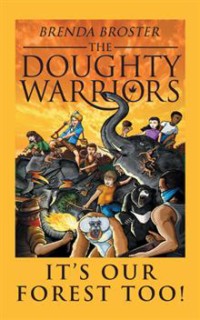Title: The Doughty Warriors: It’s Our Forest Too!
Author: Brenda Broster
Publisher: AuthorHouseUK
ISBN: 978-1-5246-6141-0
Pages: 304
Genre: Juvenile Fiction / Action & Adventure
Reviewed by: Candace L Barr
Buy Book on AmazonPacific Book Review
Author Brenda Broster’s story is of unlikely heroes saving a forest with the passion that one expects from a conservationist writing about an issue she cares deeply about. The Doughty Warriors: It’s Our Forest Too! are a band of children from diverse backgrounds are likable and their determination is awe-inspiring. The way they unite people and animals alike for a common goal drives home the idea that cooperation is key when pursuing lofty goals, indeed a great lesson for the novel’s audience. Furthermore, its central conflict—that of children trying to preserve a natural treasure from the forces of greed—drives home the importance of conservation.
The novel opens at the start of a crisis, and as the children and their parents deal with the aftermath of a forest fire set in order to clear space for the palm oil plantations. We not only learn about the characters, but we also learn about the benefits of preserving forests and the gifts they provide. The remedies for the animals’ injuries come from the same forest from which they were rescued. The action follows the children’s quest to foil the efforts of the palm oil company both in the short-term and long-term. The “warriors” interact with adults who run the gamut from wanting to help, wanting to exploit the situation and wanting to outright harm them. These interactions shape the actions they take and their measure of perseverance.
The author shows she can write good prose, as some passages charm the reader with their carefully crafted imagery, especially in scenes that take place in the forest. However, some paragraphs end up feeling choppy, and some plot points left me confused as to the timing of events. Additionally, while the main characters are great, some of the adult characters come off as cartoonish, especially Mr. Lee, the “evil palm oil baron,” who is too often referred to by that moniker instead of his name—even his employees refer to him as the “baron” among themselves. Even one of the children’s allies, reporter Shirley Pooper falls into this trap. Although both characters have scenes that provide some comic relief, they could have benefited from more dimension.
Despite these shortcomings, the story is an effective lesson about the value of natural resources, organization, unity and persistence. The care shown for the forest and its inhabitants by the many groups that make up the area around the village illustrates just how connected every living thing in the world actually is. Additionally, the children’s efforts show that the keys to meeting goals lies in forming solid plans and executing them. All in all, the reader gets a tale that shows that the need to preserve natural resources transcends age, race, religion and even species.


